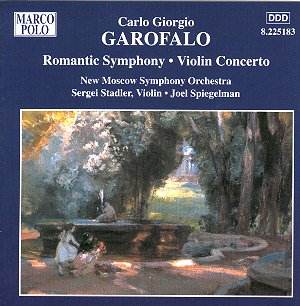It is difficult not to treat this disc as a curiosity,
but it deserves better. Garofalo is now a forgotten name (it does not
appear in my recent edition of Grove) and, though he composed a considerable
quantity of sacred and secular music and a large scale comic opera,
The Juggler (never staged), his works are virtually unknown to
present-day audiences. The only performance since 1915 of the Romantic
Symphony took place in Moscow under Spiegelman (who rediscovered the
full score) in 1994, though conductors of the status of Nikisch, Toscanini
and Serafin are said to have been great admirers.
In many respects the fate that overtook these ambitious
works was predictable. They appeared in the wake of such great nineteenth
century Romantics as Tchaikovsky, Brahms and Bruckner. By the twentieth
century Mahler, Elgar, Richard Strauss and other bright stars were high
in the firmament, and the musical public was turning away from grandiose
symphonic gestures to more exotic novelties. In addition Italian composers
of this period are not readily identified with the "Viennese monumental"
symphonic traditions in which both these works are clearly planted;
for example Respighi – a rival of Garofalo – wisely found
his inspiration in the bright colours and drama of his native country.
There is, of course, no reason why anachronisms like
the Violin Concerto and Romantic Symphony should not be listened to
for their intrinsic merits; yet, even here, perspectives can appear
strangely distorted. The cadenzas of the Concerto, beautifully played
by Stadler, spin along in seemingly endless arabesques, more reminiscent
of Tartini than the potent drama of a Bruch or an Elgar. The beauty
of the themes – and they are indeed beautiful – easily
pall in the conventionally virtuosic elaboration to which they are subjected.
The same could be said of the Symphony. While obviously a largely scale
work, it can also sound overstuffed.
The playing is sensitive and thrilling – excellently
disciplined performances by an orchestra only recently (1999) created
through the sponsorship of the Modern Times Group of Sweden. The wide
experience of Joel Spiegelman promises to bring international playing
standards and discipline which, in recent years, are sometimes lacking
in the long-established Moscow-based orchestras.
Roy D. Brewer


